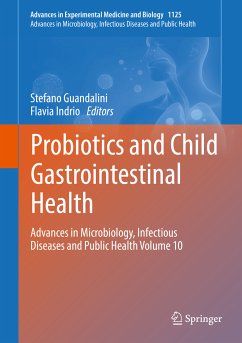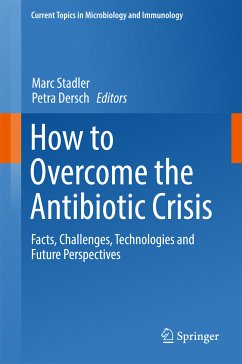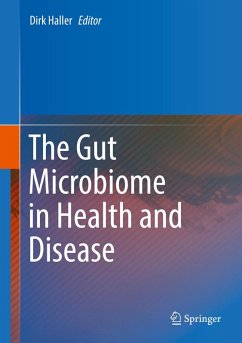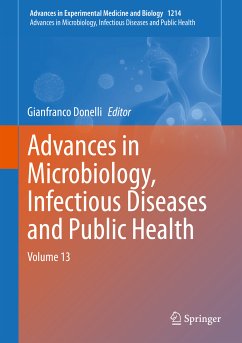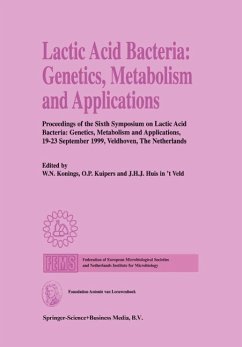
Probiotics and Child Gastrointestinal Health (eBook, PDF)
Advances in Microbiology, Infectious Diseases and Public Health Volume 19
Redaktion: Guandalini, Stefano; Indrio, Flavia
Versandkostenfrei!
Sofort per Download lieferbar
104,95 €
inkl. MwSt.
Weitere Ausgaben:

PAYBACK Punkte
52 °P sammeln!
This fully updated second edition demonstrates the major impact that the gut microbiota has on human gastrointestinal health, with a special focus on children. The book also explores the potential use of probiotic microorganisms to protect or improve gastrointestinal health in children.Humans are not a single organism: We are a multi-organic structure composed of ourselves and our microbiota, living in close symbiosis since birth and even before. The enormous impact that the billions of microscopic cells in our gut have on our gastrointestinal and systemic health cannot be overstated. The trem...
This fully updated second edition demonstrates the major impact that the gut microbiota has on human gastrointestinal health, with a special focus on children. The book also explores the potential use of probiotic microorganisms to protect or improve gastrointestinal health in children.
Humans are not a single organism: We are a multi-organic structure composed of ourselves and our microbiota, living in close symbiosis since birth and even before. The enormous impact that the billions of microscopic cells in our gut have on our gastrointestinal and systemic health cannot be overstated. The tremendous progress that has been made in the last decade in our still very incomplete understanding of the gut microbiota opens the door to potential applications in human health that were simply unthinkable before.
One of the most interesting aspects of this new scientific horizon is the fact that we can identify (or even create in the lab) many of these "friendly bacteria" and use themto protect or improve our health. Thus, strains of probiotic microorganisms are being identified and studied in a variety of clinical scenarios. One of the most studied areas for probiotics is pediatric gastrointestinal health.
Topics covered in this book range from the development of the intestinal microbiota in the fetus and neonate to current and potential applications in various conditions such as necrotizing enterocolitis or infectious or inflammatory diseases of the child.
Written by an international group of preeminent experts in these fields in a rigorous, evidence-based manner, the book is intended for pediatric gastroenterologists, pediatricians, and medical scientists alike.
Humans are not a single organism: We are a multi-organic structure composed of ourselves and our microbiota, living in close symbiosis since birth and even before. The enormous impact that the billions of microscopic cells in our gut have on our gastrointestinal and systemic health cannot be overstated. The tremendous progress that has been made in the last decade in our still very incomplete understanding of the gut microbiota opens the door to potential applications in human health that were simply unthinkable before.
One of the most interesting aspects of this new scientific horizon is the fact that we can identify (or even create in the lab) many of these "friendly bacteria" and use themto protect or improve our health. Thus, strains of probiotic microorganisms are being identified and studied in a variety of clinical scenarios. One of the most studied areas for probiotics is pediatric gastrointestinal health.
Topics covered in this book range from the development of the intestinal microbiota in the fetus and neonate to current and potential applications in various conditions such as necrotizing enterocolitis or infectious or inflammatory diseases of the child.
Written by an international group of preeminent experts in these fields in a rigorous, evidence-based manner, the book is intended for pediatric gastroenterologists, pediatricians, and medical scientists alike.
Dieser Download kann aus rechtlichen Gründen nur mit Rechnungsadresse in A, B, BG, CY, CZ, D, DK, EW, E, FIN, F, GR, HR, H, IRL, I, LT, L, LR, M, NL, PL, P, R, S, SLO, SK ausgeliefert werden.



